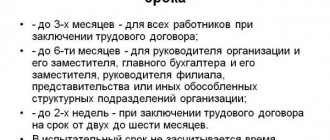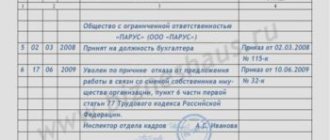Last modified: January 2021
No exam to confirm qualifications, a test to check psychological compatibility with the team and positive recommendations from previous employers can replace information about the suitability or unsuitability of a new employee, which can be obtained during the trial period. The legislation regulates the duration, categories, professions, how to provide for it in the contract and how to dismiss an employee who has not completed the probationary period.
Dismissal of someone who has not passed the probationary period
In Art. 71 of the Labor Code of the Russian Federation states that if an employee has not completed the probationary period, the employer can fire him. However, there are several features of dismissal during a probationary period at the initiative of the employer. The employer is obliged to confirm the incompetence of the employee. If this is not done, then the employee has the right to sue the employer for “illegal dismissal as someone who has not completed the probationary period” Article 71 of the Labor Code of the Russian Federation. If the employer does not justify the dismissal during the test, then the employee has every chance to be reinstated in the workplace, receive a salary for forced absence, and also demand compensation for moral damage. To document the incompetence of an employee, you need to worry about this in advance. It is necessary to document every professional “mistake” of such an employee. The employee must sign a document that confirms his professional oversight. In addition to him, the document is signed by 2 more witnesses.
Not only a negative result can cause the dismissal of an employee during a probationary period. It can be:
- absenteeism;
- failure to comply with labor discipline or internal regulations;
- unprofessional behavior.
That is, an employee on a probationary period can be fired on the same grounds as an employee working on a general basis. The employer is obliged to notify the probationary employee of the impending dismissal. This must be done within 3 days. In addition, the notice must also indicate the reason for dismissal. These 3 days are called compulsory work. Although, if the parties reach an agreement, then the employee can be fired without it. For employees dismissed as having not completed their probationary period, the same norms of the Labor Code of the Russian Federation apply as for employees working on a permanent basis. You cannot dismiss an employee for failure to pass the test if he is on sick leave. But the employee must present a sick leave certificate to the employer. However, the days that the employee spent on sick leave are not taken into account when calculating the length of the probationary period. Therefore, if the probationary period ended while the employee was sick and the employer “did not have time” to fire him, the latter can extend the probationary period for the duration of the employee’s sick leave. After such an employee returns to work, the employer has the right to dismiss him as having failed to complete the probationary period.
Legality of establishing the test
The legislation contains legal provisions that allow the employer to establish employment tests for almost all employees. Restrictions apply only to certain categories of citizens, for example, persons under 18 years of age or pregnant women (Part 4 of Article 70 of the Labor Code of the Russian Federation).
Maximum length of probationary period
In accordance with the law, the duration of the probationary period is strictly regulated. For general cases, this period cannot exceed three months, and when hiring employees for a management position - six months.
In accordance with clarifications of Rostrud No. 395-6-1 dated March 19, 2012, the above rule does not apply to cases of hiring chief accountants of separate divisions. The duration of the trial period in this case should not exceed three months (clause 3). When concluding short-term agreements from two to six months, it is permitted to establish a trial for a period not exceeding two weeks.
The moment from which dismissal is allowed
If the employer has concluded during the probationary period that the employee has not completed the probationary period, he has the right to terminate the employment agreement on his own initiative. You can dismiss an employee for failing to pass the test at any time during the specified period. This rule also applies to cases where the corresponding conclusion is made by the employer in the first days after the conclusion of the employment agreement. The legislator limited the moment of dismissal only to the course of the probationary period (Article 71 of the Labor Code of the Russian Federation).
If the employee has not completed the probationary period, but was not dismissed before the end of the probationary period, further termination of the employment contract on the specified grounds will be illegal. In this case, the employer’s inaction is confirmation of successful completion of the test.
When determining the end of the test, it is necessary to take into account that the days when the employee was absent from the workplace cannot be counted towards this period. In such a case, the probationary period must be extended by the number of days of absence.
For example, such periods include:
- temporary incapacity due to illness}
- study leave}
- leave without pay}
- period of downtime agreed with the employer}
- suspension or prohibition from work}
- absence without good reason, including absenteeism.
Documenting
If a person has not completed the probationary period, before dismissing him, you must make sure that this fact is documented. In this case, the following documents can be used as evidence:
- reports from the employee’s immediate supervisor on improper performance of official duties, confirmed by relevant acts}
- characteristics of the immediate supervisor}
- test log}
- minutes of the commission meeting following the test results}
- notice of unsatisfactory completion of the probationary period}
- employee's explanatory notes regarding failure to complete tasks}
- complaints against an employee}
- orders to bring the employee to disciplinary liability.
If a person disagrees with the dismissal and further appeals the order in court, these documents will confirm the validity of the dismissal due to an unsatisfactory test result.
Can an employee disagree with dismissal?
When hiring an employee, the company must familiarize him with the internal labor regulations, job descriptions and a number of other local documents.
Establishing a probationary period for an employee implies that the employer’s representative constantly monitors his work, recording all the employee’s achievements and shortcomings using specially provided documents.
When an employee is told that his work does not meet the requirements set out in his job description, and management notifies him of his impending termination during a probationary period, he may not agree. However, he will have to challenge this situation either in the labor inspectorate or in court.
Important! In the case where an employee refused to sign all documents related to his work, as well as acts of violation of labor discipline, orders, acts of refusal must be drawn up in the presence of witnesses.
The employee must understand that if the company has properly executed relevant documents, then his refusal to dismiss will lead to nothing, and he will most likely lose in court.
The main argument in court is a properly executed notice
If, based on the test results, it is clear that the trainee is not suitable for the proposed position, then he must be informed of his impending removal from position. The dismissal of an employee who has not completed the probationary period must be accompanied by written notice.
The notice of termination of the contract during the trial period must contain the date, reference number, signature of the person authorized to certify such documents and a seal. In addition, the notification should include the reasons why the employee intends to be dismissed from his position (Part 1 of Article 71 of the Labor Code of the Russian Federation).
As modern practice shows, the formulation of the reason for the dismissal of an employee, as a general indication of his failure to complete the probationary period, is almost always insufficient. The notice must list the main reasons for the employee’s dismissal. These may be disciplinary offenses such as: failure to complete tasks on time, failure to comply with internal labor regulations, and others. Such reasons should not be indicated unfoundedly, but based on documents that must be drawn up during the probationary period, if such misconduct occurred.
So you should remember that you need to immediately document any violations and conduct proper disciplinary conversations. One or two explanatory notes can push the intern to a more conscientious attitude to work and dismissal will not be necessary. Or the recruit will make a deliberate decision to “leave on his own.”
Was the information interesting or useful?
Yes22
No4
Share online
Dismissal of an employee during the probationary period
- employees hired on a competitive basis to fill the relevant position;
- pregnant women;
- mothers who have at least one child under 1.5 years of age;
- minor citizens;
- young specialists finding employment for the first time in accordance with their acquired profession;
- subjects appointed to elective positions in the state apparatus or local government;
- transferred from other companies by agreement of managers;
- who have entered into a contract for a period of up to two months.
- the wording must clearly indicate the subordinate’s desire to end the relationship, for example, “I ask you to terminate the employment contract”;
- the date of dismissal, indicated without pretext, allows you to accurately determine the last working day, for example, “I ask you to fire me on May 22”;
- the document must be certified by the signature of the employee, otherwise it has no legal force.
Duration of probationary period and work off upon dismissal
The basic rules defining the probationary period and its duration are enshrined in the Labor Code of the Russian Federation. According to them, the trial can be set from two weeks to three months.
Attention! The maximum probationary period for employment for ordinary employees cannot be more than three months.
For management positions, which include the director, his deputy, chief accountant, etc., this period may be set for a period of up to six months.
For employees of state bodies and municipalities, in accordance with regulations, the duration of the test can be one year.
When drawing up a contract lasting up to six months or for temporary work, the trial period is fourteen days, and for a contract with a validity period of up to 2 months, it should be absent altogether.
Important! Legislation prohibits the provision in labor contracts of a probationary condition for workers under 18 years of age, pregnant women, employees with young children, specialists who have just graduated from educational institutions, people hired by competition or by election, as well as employees entering the company on a preliminary basis. offer of transfer from another company.
How to justify it correctly
There is a misconception among employers that during the entire probationary period it is permissible to simply dismiss an employee without giving any reasons, simply because he was “not suitable.” This is completely incorrect, and this action can be protested by the employee in court, and the employee himself, by a court decision, can be reinstated in his job.
To avoid such problems, it is necessary to prepare thoroughly for the possible dismissal of employees who have not completed the probationary period. The following documents can serve as confirmation of the legality of dismissal:
- memos from the immediate supervisor;
- acts on the release of low-quality products;
- complaints from colleagues and clients;
- explanatory notes from the employee on facts of failure to complete tasks or violation of labor discipline rules;
- various disciplinary sanctions;
- reviews, characteristics of managers, mentors responsible for completing the probationary period.
Naturally, it is not at all necessary to have all the above documents, but it is advisable to prepare at least several such evidence of dishonest or unskilled work.
If the employer subsequently decides to retain the employee to continue cooperation, these documents simply will not be needed. But their presence makes claims against the employee much more significant.
If an employer decides to dismiss someone who has not completed the probationary period, they must be notified in writing of the upcoming dismissal 3 working days in advance. The notice of dismissal is drawn up in 2 copies; upon delivery, the employee must put the date and personal signature on the employer’s copy. If the employee refuses to confirm the fact of receipt of the notice, then a corresponding entry is made about delivery on a copy of the notice, which must be confirmed in writing by two witnesses.
Next, the manager issues a dismissal order with appropriate wording.
The work book also records dismissal due to unsatisfactory results of the probationary period. The work book is issued to the dismissed employee with a personal signature on the last working day, if he is present at work on that day. If he is absent, on the same day you should send him a notification by registered mail about the need to obtain a work book, so the employer will protect himself from possible claims about the untimely issued work book.
How to open your own transport company? All the details about this popular business are given in the article.
The employee must also receive the final payment on the last working day. And in his absence - the next day after applying for payment.
It should be remembered that no severance pay is provided upon dismissal without completing the probationary period.
It can also be noted that during the probationary period, the employee has the same rights as the employer, that is, he can quit by notifying the employer 3 days in advance if he decides that the working conditions do not suit him.
Despite the fact that formalizing the resignation of an employee during an internship is easier than starting the dismissal procedure after a probationary period, it is clear that this action requires carefully prepared documents and additional time and effort on the part of the employer. Meanwhile, many employees, understanding the employer’s intention to fire them under Article 71 of the Labor Code of the Russian Federation, are often ready to compromise and terminate the employment contract by agreement of the parties, which is much less labor-intensive for the employer and often saves him a lot of nerves.
How to confirm the professional incompetence of an employee?
In accordance with Article 71 of the Labor Code of the Russian Federation, in case of disagreement with the employer’s decision to dismiss, a subordinate has the right to appeal in court the decision not to pass the test. In this regard, the employer needs to record, preferably documented, the fact of the employee’s professional incompetence.
It is possible to confirm the fact that an employee cannot cope with his duties provided that he was familiar with the job description. In addition, the employer can draw up a work plan for the probationary period, in accordance with which the subordinate must act. Based on the execution of the plan items, it will be possible to draw certain conclusions regarding the employee’s business and professional qualities.
Reference. Before recording in the reports the employee’s failure to fulfill the duties assigned to him, it is necessary to familiarize him with the job description, the work plan for the probationary period, confirming the fact of familiarization with the employee’s personal signature.
What documents need to be completed?
Documents that can be used to confirm the insufficient professional competence of a subordinate include:
- Various acts indicating that the employee does not fulfill or improperly fulfills his duties specified in the employment contract or job description. Acts must be drawn up in the presence of at least 2 witnesses and describe in detail specific facts of non-fulfillment or improper performance of duties. The employee must be familiar with the drawn up acts against signature.
- Reports or memos sent to higher management by the employee’s immediate superior in connection with violations committed at work. These documents are drawn up in connection with identified violations. The employee must be familiarized with them and asked for clarification on the facts presented.
- Explanations of the employee provided by him in connection with established facts of improper performance of official duties.
- Explanatory notes from other employees.
- Orders to impose disciplinary liability, issued in compliance with the requirements of Art. 193 Labor Code of the Russian Federation.
- Recorded complaints from customers (for example, their written complaints).
- A report on the implementation of the work plan during the test period, subject to its preparation and familiarization with the employee.
The list of documents is not closed and clearly fixed. There may be other documentary evidence of the employee’s professional incompetence.
Entry in the work book about dismissal as someone who has not completed the probationary period
An example of this condition can be viewed here. Indication of the above in internal documents, for example, in an order, is not mandatory; in any case, it is void.
The key point is indicated above: if there is no such provision in the agreement, then there is no test, accordingly, exemption under Art. 71 will be illegal and easily challenged in court. In addition to general reasons, in this case you can even use such reasons as lack of harmony in a team (but this must be proven, conflict situations with witnesses must be recorded).
Typical reasons are as follows: If the hired citizen continues to perform his duties, then he is considered to have successfully completed the test and can be dismissed under Art.
71 TC is not allowed. These periods also include the following: The employer must be aware that he will be punished if he breaks the following rule.
Alternative to dismissal
In fact, there is only one alternative that will avoid dismissal of the employee - extending the probationary period itself. However, this procedure is very complex, and in order to carry it out legally, many conditions will need to be met.
Extension is possible both compulsorily and by agreement. The probationary period can be increased without the consent of the employee only if he did not fulfill his duties or did not cope with the conditions of the probation for a good reason (for example, he was absent due to illness).
Voluntary extension is a completely different matter. This is possible only if a number of conditions are met:
- Both the employer and the employee agree to increase the probationary period;
- The extension will not violate the employee’s rights in any way and will not put him in worse conditions;
- The maximum test periods established by the Labor Code of the Russian Federation will not be exceeded.
Extending the probationary period will be a good alternative to dismissal, but only if the employee showed himself to be good, but was unable to cope with the task or simply did not have time to complete it. In this case, the extension will not only allow him to complete his training in the necessary skills, but also to better understand the essence of his own responsibilities and principles of work. In this case, the employer will not spend either time or money to find and train a new person.
Good reasons for dismissal
According to surveys, in 67% of cases, the employer evaluates how successfully the probationary period was completed by the quality of the completed tasks assigned to the new employee, in 61% of cases by his professional suitability for the position held
Some employers pay attention to mistakes made, as well as established KPI indicators
The reasons for dismissing an employee should always be related to failure to fulfill work duties and obstruction of the work process. It is impossible to fire a person for his personal qualities, beliefs and passions if this does not interfere with his ability to perform his job duties. A notice of upcoming dismissal must always indicate a valid and truthful reason, otherwise the employee will be able to challenge the decision in court.
Dismissal as someone who has not completed the probationary period may be carried out for one of the following reasons:
- Disciplinary violations – coming to work drunk or under the influence of drugs, failure to comply with the work schedule, failure to show up for work on a working day.
- Poor performance of duties - disruption of the production process, reduction in productivity indicators, inappropriate treatment of the organization's clients.
- Failure to comply with internal regulations - the employee does not wear a uniform, if provided, does not adhere to the dress code and safety regulations.
- Late execution of instructions if this interferes with the normalization of the work process.
Can they be shortened during the probationary period? Read here.
Watch a video that will tell you in detail about the dismissal of an employee who has not passed the probationary period.
If the reason for dismissal is disciplinary inadequacy of the position or failure to fulfill duties, it is advisable to have documentary evidence of violations. Documents such as reports and explanatory notes, complaints against an employee from clients and colleagues, confirmation of the production of low-quality products, as well as oral and written testimony can easily convince the court of the legality of the employer’s actions.
Information on compensation for dismissal during a probationary period can be obtained from this link.
It is better to discuss possible reasons for dismissal due to an unsatisfactory test result with the employee before signing the employment contract. A preliminary agreement documented by the terms of the contract will increase the employer’s chances of winning in litigation if they arise.
When to remove an unsuitable employee from a position
A contract with a worker can be terminated at any time: both at the beginning and at the end of the probationary period. As soon as his incompetence is visible. And the employer’s inaction after the completion of the trial period will automatically confirm the employee’s successful completion of the test. Therefore, the worker cannot be dismissed after the end of the trial as having failed to complete the probationary period.
If he was absent from work due to illness, leave without pay, study leave, suspension from work, then the test is extended for the corresponding number of days of incapacity. Downtime at work due to the employer's fault is also not included in the probationary period. And business trips and business trips (Part 1 of Article 166 of the Labor Code of the Russian Federation) are counted towards the test.
Unlawful dismissal during a probationary inspection is considered:
- if neither party terminated the contract after completion of the test;
- if before the end of the inspection the employee was transferred to a higher position.
Documentation of the terms of the probationary period
Legislatively, the possibility of dismissing an employee during a probationary period is enshrined in Part 1 of Art. 70 Labor Code of the Russian Federation. In this case, such dismissal is permitted only if, at the time of employment, the employee was notified of the probationary period in writing. This is enshrined in the following documents:
- The order of acceptance to work. In the appropriate column of this document, it is necessary to note the presence and duration of the probationary period.
- Employment contract. When signing this document, you must also indicate information about the probationary period. Otherwise, the employee will be considered employed in the general manner, so it will not be possible to dismiss him as someone who has not completed the probationary period.
The condition must be included in both of these documents. As for the work book, when filling it out, it is not necessary to indicate the fact that a probationary period has been established.
The employee confirms his consent to this condition when signing the contract, as well as when drawing up an application for employment.
In this case, it is worth taking into account the maximum possible duration of the probationary period established by law:
- 2 weeks - for employees working under short-term employment contracts (from two months to six months);
- 3 months - for all other employees with open-ended or long-term contracts;
- 6 months - for testing top management (director, deputy director, chief accountant).
The manager has the right to set a shorter period, but he cannot increase it. This is allowed only if the employee is absent from his workplace.
For example, this can happen during sick leave, free vacation, absenteeism or forced downtime.
Then the probationary period can be extended by the number of days the employee is actually absent.
Who should not be accepted for probation?
If you want to dismiss without problems a careless employee who cannot cope with his job responsibilities, then you need to study the labor code in detail and understand some of its paragraphs. You should know that there is a category of persons who are not allowed to be placed on probation. These include:
- Persons who are under age.
- Employees who came to work for the company after receiving vocational education.
- Young employees after secondary specialized, postgraduate or university education.
- Seasonal employees, temporary employees.
- Disabled people of groups 1–3.
- Pregnant women, as well as those who have a newborn under 1.5 years of age.
- Employees who are hired through competition for deputy positions.
- Employees who are transferred from one department to another or from one office to another.
These categories of persons are unacceptable to accept on the IP, otherwise it will be considered a violation with all the ensuing consequences. They can either complain to the labor inspectorate or simply demand that they be enrolled on the basis of an order.
Dismissal of someone who has not completed the probationary period of the Labor Code of the Russian Federation
Many employers believe that it will be enough to fix the probationary term only in the employment order, but this position is wrong. Because if the labor agreement does not specify a probationary clause, the organization’s worker will be considered hired without a probationary period and it will not be possible to dismiss him as someone who has not passed the probationary period.
- regulations on internal labor regulations, which should be in every organization and are developed, as a rule, on the basis of a standard one;
- a job description developed specifically for the workplace where the employee was hired and approved by management;
- local regulatory documents that regulate the activities of the trainee at a specific place of work (instructions, orders, regulations);
- an order for employment was issued, with which he must have been familiarized with his signature.
Dismissal for failure to complete probationary period
If the employer's assessment of the new employee's test results is unsatisfactory, this will entail the dismissal of the latter in a simplified manner provided for in Part 1 of Article 71 of the Labor Code of the Russian Federation, namely, the employee is dismissed after appropriate notice given three days before the last day of work, indicating the reasons termination of the contract.
The employer does not have the right to decide that the new employee has not completed the probationary period and dismiss him on the basis of Part 1 of Article 71 of the Labor Code of the Russian Federation at a time when the employee is on sick leave or on vacation, because such actions are prohibited by part 6 of article 81 of the Labor Code of the Russian Federation.
Dismissal of an employee for failure to complete the probationary period
The work book also records dismissal due to unsatisfactory results of the probationary period. The work book is issued to the dismissed employee with a personal signature on the last working day, if he is present at work on that day. If he is absent, on the same day you should send him a notification by registered mail about the need to obtain a work book, so the employer will protect himself from possible claims about the untimely issued work book.
In order for an employer to have the opportunity to fire an employee who has not passed the test, the probationary period must be fixed in the employment contract with the employee and in the order for his employment. In Art. 70 of the Labor Code of the Russian Federation also describes the method of formalizing a probationary period in the form of an agreement that must be signed by the employee before starting work.
How and under what article to dismiss an employee who has not completed the probationary period
- Submit a written notice of your decision, which is handed to the applicant against signature (at the latest, three days before the end of the test). Copies of evidence (journal entries, complaints, reports) of the candidate’s inadequacy for this position are attached to the notification.
- Over the next three days, a dismissal order is issued, the enterprise block in the work book is closed, and the employee’s final payment is made.
- If the employee does not want to sign the notice, a report is drawn up stating that the company has complied with all the conditions of the trial period, with the certifying signatures of witnesses and copies of documentary evidence attached.
- If a person does not appear at the company from the moment the notification document was delivered to him, you should send him a letter to his registration address, which will inform him that his work documents and settlement amounts can already be collected.
We recommend reading: How to buy a house using mat capital
Art. 71 not only provides for an accelerated dismissal process, which can be completed within just three days (instead of two weeks). Employers are allowed not to wait until the end of the probationary period to terminate the employment relationship if there are serious violations on the part of the employee.
Official internship procedure
Many companies have an official internship procedure. When concluding an employment contract, the future worker should be given a work plan against his signature for the entire probationary period, which should indicate (by day, week, month) what he must do, be able to do and know, as well as evaluation criteria. The employee writes a report on the work he has done, and based on the results of the internship, it is possible to conduct an official test with a protocol of results. However, if during the probationary period management has certain doubts or complaints about the results of the trainee’s work or compliance with work regulations, then these points should be recorded. And after that, no less than three days before the end of the probationary period, you should talk with the employee, providing him with a “Notice of failure to complete the probationary period.” The notice is given to the employee in the presence of 2 people.
Further, it should be noted that there are 3 options for the course of events:
- The employee does not want to be removed from office under Art. 71 of the Labor Code of the Russian Federation, and he can ask the employer to allow him to resign by writing a statement of his own free will. If the employer agrees with this, then he must ensure that the application is written no later than three days before the expiration of the probationary period.
- If the trainee signs the notice, he can then go to court. While on a trial period, on the last working day, the trainee picks up a work book with a written note on the dismissal clause. And if the trainee does go to court, then all the documents that he signed when hired, as well as the reports that he wrote every week or excuses for not being able to complete any of the tasks, will be needed.
- There is a situation when an intern categorically refuses to accept dismissal as having failed to complete the probationary period and does not want to sign the notice, and also does not agree to write a statement regarding dismissal based on his own initiative, i.e. at your own request. In this case, it is necessary to draw up an Act on the dismissal person’s refusal to sign; it must contain the signatures of all witnesses to this event. The employee (legal department or human resources department) is required to send the Notice by mail to the intern's home address (this letter must be accompanied by return receipt requested). In this letter it is worth pointing out that, based on the fact that he saw the corresponding notice, but did not want to sign, an Act was drawn up on his refusal to sign, and he will be fired on the day that was the last day of his work during the probationary period. The letter should also contain an invitation to appear at the personnel department of the enterprise or company in order to pick up your work book. The organization's personnel service issues a dismissal order, the date of which is the last day of work of the dismissed employee on a probationary period.
Back to contents
Sample notice of failure to complete the probationary period
Currently, employment in most companies requires a probationary period. During the probationary period, the company's management evaluates the professional and personal qualities of the employee, and at the end of it, makes a decision on the employee's further work in the company. If the employee fails the test, he may be summarily dismissed on the basis of notice. In this article we will talk about notification of failure to complete the probationary period and the mechanism for dismissing an employee.
The current legislation does not provide clear criteria according to which an employee is considered to have passed/failed the probationary period. Each company develops requirements individually and approves them in internal regulatory documents. To maintain transparency and to avoid claims from the employee, the company’s management, as a rule, defines separate criteria and requirements in the context of the activities of a specific division.
How to fire an employee who has not completed the probationary period?
An employer can protect itself from unscrupulous or incompetent personnel by using a probationary period established upon hiring. If the result of the test does not satisfy the organization, you can part with the employee before the end of the test period. An unsatisfactory test result is understood as an employee’s incompatibility with the work assigned to him in a certain position or profession. The fact of such a discrepancy must be documented.
The basic rules for dismissing an employee who has not completed the probationary period were prepared by Anastasia Morgunova, director of the tax consulting department of online accounting “Moye Delo”.
No test - no dismissal
Dismissal due to an unsatisfactory test result can only be given to an employee who, upon hiring, by agreement with him, was given a test (Part 1 of Article 70 of the Labor Code of the Russian Federation, letter of Rostrud No. 1329-6-1 dated May 17, 2011 ). The test condition must be stated in the employment contract and in the hiring order (paragraph 3, part 4, article 57 of the Labor Code of the Russian Federation).









